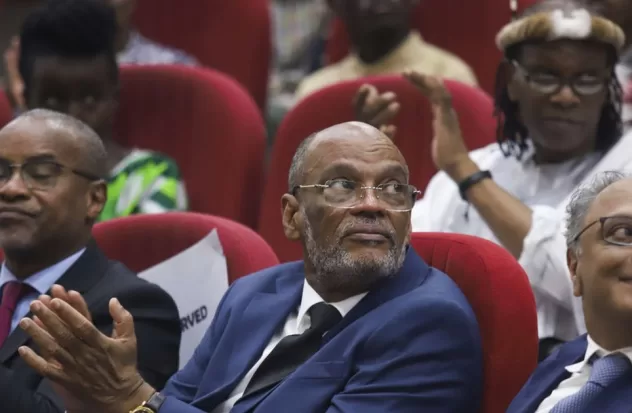PRINCE PORT.– He Prime Minister of Haiti announced that he will resign from office once a transitional council has been formed in the country. His resignation was a concession to international pressure trying to save a nation overtaken by violent gangs, which some experts say have waged a low-level civil war.
Henry made his announcement hours after leaders of Caribbean countries and United States Secretary of State Antony Blinken met in Jamaica to urgently address a solution to stop the growing crisis in Haiti.
“The government that I lead cannot remain insensitive to this situation.”. “There is no sacrifice too great for our country,” Henry said in a recorded statement. “The government I lead will withdraw immediately after the establishment of the council.”
Henry has not been able to return to his country because the violence caused the closure of its main international airports. He arrived in Puerto Rico a week ago when he was not allowed to land in the Dominican Republic, according to authorities because he lacked a flight plan. Dominican authorities also closed airspace to flights to and from Haiti.
At first it was not clear who would be chosen to lead the way out of the crisis, in which heavily armed gangs have burned police stations, attacked the main airport and assaulted two of the country’s largest prisons. More than 4,000 prisoners escaped in those assaults.
Dozens of people have died in the violent attacks and more than 15,000 Haitians have been left homeless after fleeing their neighborhoods during the fighting. Food and water are scarce as stores selling to impoverished Haitians run out of stock. Port-au-Prince’s main port remains closed, leaving dozens of containers with crucial supplies stranded.
The urgent meeting in Jamaica was organized by the Caribbean Community (CARICOM), a regional trading bloc that has been pushing for months to form a transitional government in Haiti, while protests in the country demanded Henry’s resignation.
Guyana’s President Irfaan Ali said the transitional council would have seven voting members and two non-voting members.
Among the voting participants was the Pitit Desalin party, led by former senator and presidential hopeful Moïse Jean-Charles, who is now an ally of Guy Philippe, a former rebel leader who led a successful coup in 2004 and was recently released from a US prison after pleading guilty to money laundering. The EDE party of former Prime Minister Charles Joseph, the Fanmi Lavalas party, the December 21 coalition led by Henry, the Montana Agreement group and members of the private sector will also have a vote.
Before sharing details about the proposed transition council, Ali said, “I want to pause and thank Prime Minister Henry for his service to Haiti,” as leaders and other attendees applauded.
Henry was the longest-serving prime minister since the Haitian Constitution was approved in 1987, an unexpected feat for an unstable country with a constant rotation of leaders. He was sworn in almost two weeks after the assassination of President Jovenel Moïse on July 7, 2021.
Henry’s critics point out that he was never elected by the population, much less by the parliament, which has not existed since the terms of the last remaining senators expired in January 2023, leaving Haiti without a single elected representative.
As Haiti prepared for new leadership, Some experts wondered what role the heavily armed gangs, which now control 80% of Port-au-Prince, would play.
“Even if there is a different kind of government, the reality is that you have to talk to the gangs,” said Robert Fatton, an expert on Haitian politics at the University of Virginia. “You can’t silence them.”
Officials, he noted, will have to deal with armed groups and try to convince them to disarm, “but what would their concessions be?”
Fatton noted that the gangs have the dominant position in terms of control of the capital. “If they have that supremacy, and there is no force that can confront them, it is no longer a question of whether you want them at the table, they may simply keep the table.”
Blinken had earlier on Monday announced an additional $100 million to fund the deployment of a multinational force to Haiti, as well as another $33 million in humanitarian aid and the creation of a joint proposal agreed to by Caribbean leaders and Haitian stakeholders that would expedite the creation of a “presidential college.”
He said the college would take “concrete measures” — which he did not identify — to meet the needs of the Haitian population and allow for the pending deployment of the multinational force that will lead Kenya. Blinken also noted that the US Department of Defense had doubled its support for the mission, after previously setting aside $100 million.
As the leaders met behind closed doors, Jimmy Chérizier, considered Haiti’s most powerful gang leader, told reporters that if the international community continued down the same path, it would “plunge Haiti into more chaos.”
“We Haitians have to decide who is going to be the leader of the country and what model of government we want,” said Chérizier, a former elite police officer known as Barbecue who leads a federation of gangs known as G9 Family and Allies. “We are also going to look for how to get Haiti out of the misery it is in now.”
The powerful gangs have been attacking important government targets in the capital, Port-au-Prince, since February 29. Henry was then in Kenya to promote a United Nations-backed deployment of the African country’s police, which has been delayed by a court ruling.
The Haitian government announced Monday night that it was extending the nighttime curfew until March 14 in an attempt to prevent new attacks.
Source: AP

